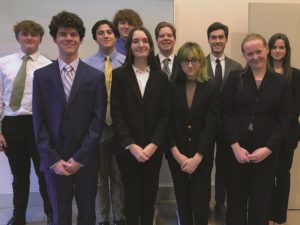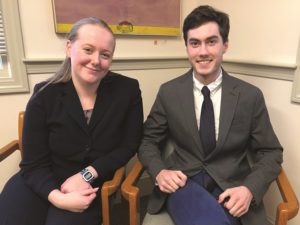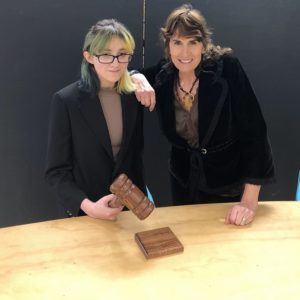Eastham — It requires the precision of fencing, the flexibility of gymnastics, and the strategy of football. But it doesn’t take place on a field or in a gymnasium. It takes place in a courtroom, and the Nauset Regional High School mock trial team is a champion in the court.
The crew of 11 “lawyers” and “witnesses” was crowned the best mock trial team in the Cape Cod region in February after defeating all three of its Cape competitors — Monomoy High School, Sturgis West, and Cape Cod Academy.
And on Feb. 27, the team beat Carver High School 98-94 in what is known as the Sweet 16 tournament, where the top schools from each of the 16 regions across the state compete against one another.

This means that the team is headed to Boston next week to face off in the Elite Eight; if they win, they will make it to the Final Four, and then the state championship, which takes place in the Great Hall in Faneuil Hall.
This is the furthest Nauset has advanced in recent history, said Orleans attorney Bonnie Nunheimer, who has been coaching the team for seven years. She works alongside Katie McCurry, who teaches criminology at Nauset High.
“We are all over the moon,” said Nunheimer. “They continue to strive to do the best they can every time, and they just keep getting better.”
McCully said that the students’ trial against Carver was their best one yet. “They knocked it out of the ballpark and absolutely wowed the judge,” she said.
But success for these litigators isn’t just about the number of points they scored or how far they advanced in the tournament. “We’ve grown so much as a group,” said senior Emily Plansky, who co-captains the mock trial team along with senior Alex Dutoit. “It’s been so cool to see my teammates stand up in front of the judge and flourish when just two weeks ago they were so nervous to even compete,” she said.

At the beginning of the season, the team received a case packet from the Massachusetts Bar Association, which runs the program. The packet contained a fictional case for which team members had to prepare an argument for each side, plaintiff and defendant, using only the material provided in the packet: witness statements and affidavits, pretrial stipulations, and relevant Massachusetts General Laws and case law.
The type of case alternates each year between civil and criminal. This year’s is civil, but the specifics of the case cannot be disclosed because the season is still underway.
Typically, a team does not know which side they will argue until the judge, who is played by a local attorney, flips a coin. But this winter looked different for teams in Massachusetts. After two years of remote competition due to the pandemic, this year’s trials were hosted at the competing schools rather than in a courtroom. The host school argued the defense, and the visiting school was the plaintiff.
Nauset was the plaintiff against Monomoy and hosted the next two trials against Sturgis West and Cape Cod Academy as the defense.
“Defense is much harder,” said Plansky. “We’ve also done it so much more, so we’re more comfortable with it.” During the Sweet 16 competition, the mock trial team showed its versatility when it opted to be the plaintiff after a coin toss and still won.
Each member of the team plays either a lawyer or a witness; roles are assigned for both sides at the beginning of the season. The trial is a close simulation of the real deal, beginning with opening statements, then direct and cross-examination of witnesses, and finally closing arguments. Lawyers are judged based on content and presentation, including their knowledge of case theory, evidence, and strategy, as well as their demonstration of diction and courtroom etiquette. All individual competitors are scored on a scale of ten by the judge.
The role of the witness is much more of an acting challenge, said senior Jacob Packard. An excellent witness demonstrates knowledge and command of character and performs in a compelling and convincing way.
“You have to enter the witness stand knowing which parts of the witness’s personality will help your case and what you should leave out,” said Packard. It’s part memorization and part improvisation. “You have to know how to respond under pressure and how to answer a difficult question in a way that alleviates that pressure,” he said.
“Jacob plays this character who is a sleazeball and is motivated by money, but when he gets up there, he makes the character seem completely reasonable,” Plansky said.
“We all have different skills we bring to the table,” she added. “That’s what has been so fun about this season — seeing the different ways each of us fills our roles.”

The two coaches, McCully and Nunheimer, developed a symbiosis that has contributed to the team’s synergy. “Bonnie as the lawyer is obviously looking at the law piece of it,” said McCully. “But I’m looking at all the little technicalities that can give them an edge.” Though this is McCully’s first year coaching the team, her 22 years coaching athletics has prepared her for the role. “There are actually a lot of similarities between coaching this team and coaching sports,” she said. “Especially with the competition piece of it.”
Nunheimer has been coaching Nauset’s mock trial team for seven years, and she has no plans to stop. “It’s the best part of my day,” she said. “It’s so rewarding to see them work as a team. They’re in different grades, have different friend groups, but they all come together and work so hard to kick it up a notch every single time.”
Regardless of whether members of the team hope to go into law, Nunheimer and McCully say that the lessons mock trial teaches are universal. “These are life skills they are learning,” said McCully. “Communication skills are the key to success.”
“It teaches them to think on their feet, to articulate an argument, and to be comfortable speaking in front of an audience,” said Nunheimer.
The team is on the older side this year, with five of the 11 members graduating in May. But McCully has no doubt that the team will keep growing. “Our experienced students have really helped set the stage for all the new students,” she said. “I’ve seen the underclassmen blossom throughout the season and rise to incredible levels.”
“Membership in extracurriculars has been so low recently because of Covid,” said Plansky. “I used to have this anxiety that when the seniors this year leave, everything will sort of fizzle out. But I don’t have that fear with this team, because so many people have stepped up. The question is not if there is going to be a captain next year. It’s who is going to be captain.”



